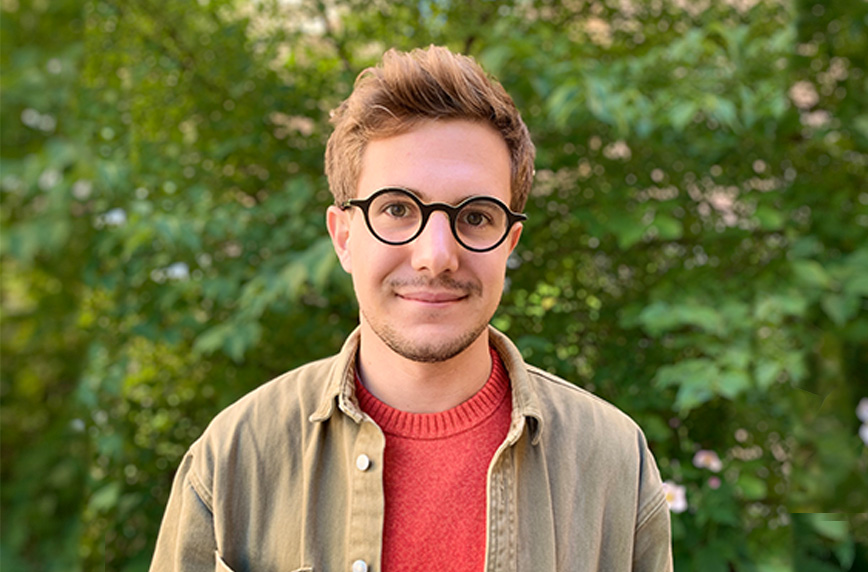Leonardo
Leonardo is 23 and studies Applied and Computational Mathematics at KTH. He's from Capri, Italy, but has lived in Milan most of his life. In Milan, at Politecnico, he also completed my bachelor's studies in Engineering Mathematics. He regards himself as a curious person, and always tries to nurture his creative side. For this reason, he tends to get involved in many different projects besides Math. For example, he currently has a part-time job as a CRM intern while also working as a copywriter for a jewellery brand. In this way, he's able to work in a field related to data science whilst also practising his creative writing skills. Besides this, since he's from an island, he has a strong passion for anything related to the sea, from shipbuilding to scuba diving.

Why did you choose this master's programme at KTH?
I received most of my education, from elementary school to my bachelor's degree in Milan. Even though I have a special bond with the city, I was looking for an opportunity to broaden my horizons and keep growing as an individual. I decided that to do this, I needed a change of setting, so I started investigating master's possibilities abroad. KTH and Sweden, in general, came up as a natural first choice. On the one hand, KTH is a leading institution worldwide for studying Engineering Sciences. Furthermore, I have always been fascinated by Scandinavian culture. Even though I had never been to Sweden before, I knew that Sweden was a place where innovation is encouraged, and there is no fear of breaking from established practices.
When I was about to complete my bachelor's degree, I wanted to keep deepening my knowledge in Math and actively participate in research and real-world challenges rather than focus solely on theory.
What are the best aspects of your programme?
I like the fact that Mathematics is actually "applied''. Most courses include projects and assignments very close to real-world scenarios, and there is a good balance between theoretical concepts and their use in practice. Another aspect that I find positive is that there is quite a lot of freedom in the choice of courses, and one can still include some lessons from a track other than his own. For example, while most of my interest is in data science, I still have the opportunity to learn about optimisation and Financial Math.
Have you chosen a specialisation track within the programme?
I chose the data science track. It is a track that focuses on classical statistics and the latest computer-intensive methods for data analysis. The reason I chose it was because its applications are virtually infinite. A data scientist master's student uses techniques to analyse and solve problems ranging from biomedicine to marketing, and I find this extremely powerful.
What are some of your favourite courses so far?
Having chosen the data science track, I loved all the related courses. In the course Numerical Algorithms for Data-Intensive Science, I learned the importance of linear algebra and computational efficiency and their use and implications in problems such as image recognition, time series analysis and clustering. In Computer Intensive Methods in Mathematical Statistics, I learned some of the most advanced techniques for stochastic simulations and their implications in Machine Learning, particularly Bayesian learning. However, my favourite course is the one in Regression Analysis. The best part was that it included a project collaborating with an insurance firm. The project's goal was to use actual data provided by the company to estimate the correct premium for travel insurance.
How is student life in Stockholm?
Stockholm is a very diverse city and attracts students and young professionals from all over the world. For this reason, it also is a very English-friendly place and not speaking Swedish is not a problem. In addition, the students' union and the international students' chapter (THS Main) bring students together by organising plenty of fun events and trips that made me feel at home and meet exciting people. A possible downside is that Stockholm can be expensive to live in, especially if you come from abroad. However, the problem can be tackled by exploring the options available to students for housing and other student discounts.
How would you describe your time at KTH so far?
Time at KTH has flown by really fast. It seems yesterday that it was August 2021, and I just started my academic career here. KTH is no easy school and requires effort and consistency, but it also gives back a lot in terms of satisfaction. After a long, demanding project, there is nothing better than looking back at the hundreds of lines of code and seeing everything run smoothly.
The most excellent part about this year was that, through thick and thin, I always got to share this journey and work together with amazing people. It is surprising how easily you can get along with people with different cultural and academic backgrounds and how enriching this is.
What do you want to do after graduating?
I aspire to work in strategic consultancy applying machine learning and artificial intelligence. I like the idea of working on various projects and changing fields of study every six months. I feel versatility and transversality are the most valuable aspects of becoming a data scientist.
What would you like to say to students thinking of choosing KTH for master's studies?
I would tell them that it has been a great challenge and opportunity for me. KTH provided me with the hands-on approach that I was looking for and made me feel like an actual player in my field by interacting with fellow students, PhD students and professors on a whole new level. This is why, if I were them or could go back to last year, I would surely take this opportunity.
